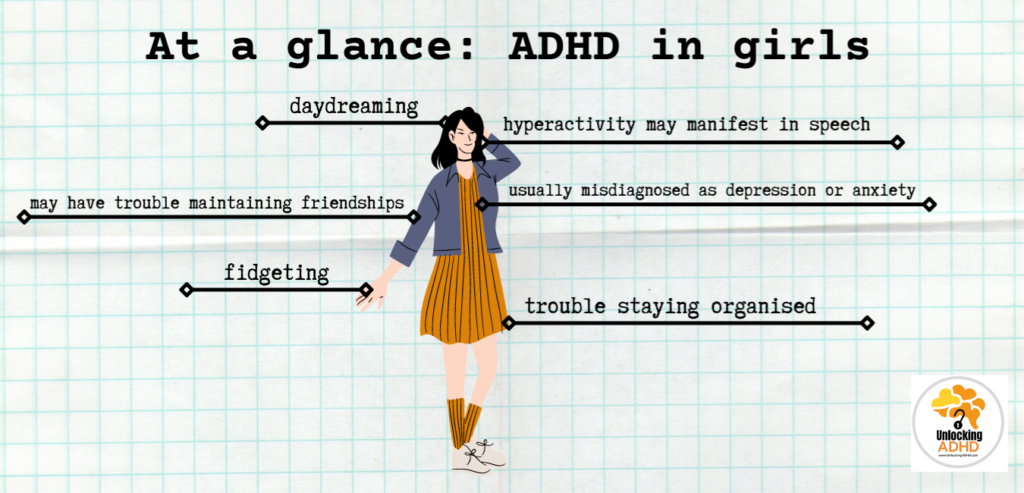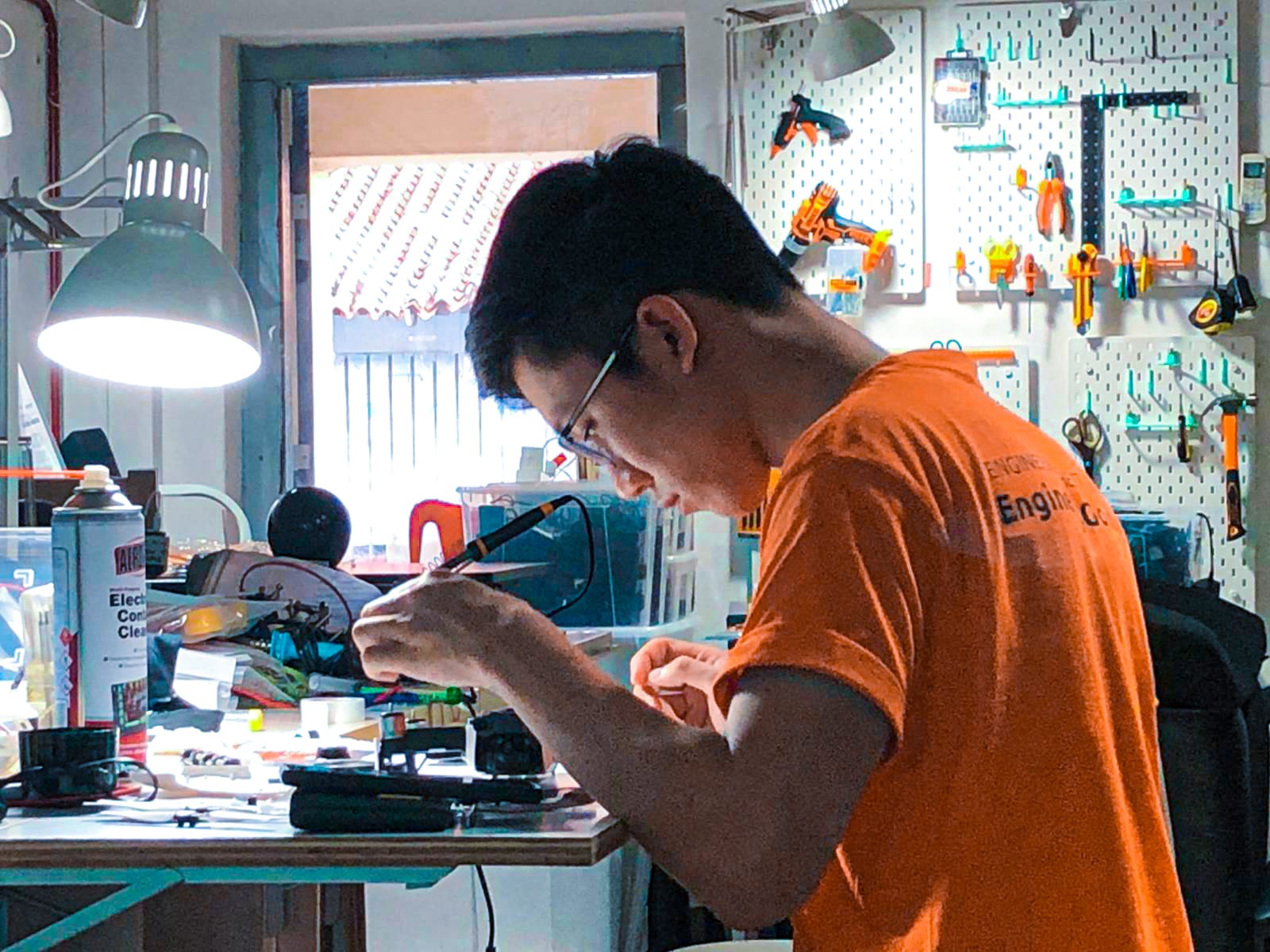Follow us on Telegram for the latest updates: https://t.me/mothershipsg
Growing up, I used to have a negative impression of Attention Deficit Hyperactivity Disorder (ADHD), thanks to a rather unfortunate incident in class.
My class was one of the naughtiest in school and my classmates and I had a school-wide reputation for wreaking havoc in our classroom.
One day, my form teacher came into class with four wooden letters, each about the size of an A4 paper, and stuck them on the whiteboard in front.
It read “ADHD”, referring to Attention Deficit Hyperactivity Disorder, and he said something along the lines of — and I remember this clearly to this day:
“This is what you are, a lost cause, if you continue down this road.”
And from then on, I associated the condition with words like “delinquent”, “no future” and “reckless”— just a few choice words that my teacher had for my classmates and I.
But all that changed when I met Megan Tan and Chong Ing Kai.
Both Tan and Chong live with ADHD and through our chats, I’ve come to learn about the different myths concerning people with ADHD.
Diagnosed at 21 years old
 Image from Megan Tan.
Image from Megan Tan.
“As an adult, everyone else seems to be juggling multiple balls in the air but with ADHD, I feel like I’m constantly dropping all of them.”
In some ways, Tan is different from the mental image you might have of someone living with ADHD. For one, the 22-year-old was only diagnosed with the condition last year, after living with her symptoms for years.
Living with undiagnosed ADHD throughout her childhood always made her question her own intelligence.
She admitted that she wasn’t the best student and had a rather complicated relationship with studying – most times, she caught herself sitting at her desk, daydreaming and staring blankly into space.
“What did you think about”, I asked.
“Maybe I saw something in the corner of the room, then I’d think about it. Then I’d think of another thing linked to that. And it goes on and on.”
“Because of that, I had a hard time focusing on my homework. So one day, my mum bought a giant poster that had the word “FOCUS” on it and stuck it on my wall.”
Perhaps her mother hoped it’d serve as a daily reminder for but the poster did nothing more than remind her that focusing was a difficulty she couldn't seem to overcome.
Before she was diagnosed with ADHD, Tan would be easily overwhelmed whenever she had a list of things to do, causing her to doubt her own abilities.
Her struggles with ADHD can perhaps be best understood through an incident that occurred about three years ago when she was packing for a school trip.
A million thoughts rushed through her head:
What if I can’t finish packing?
What if I get to my destination only to find that half the things I need are missing?
Would people yell at me for not being able to complete such a simple task?
Soon, her room became a heap of mess; the packing situation seemed to deteriorate by the minute.
Tan immediately burst into tears as she felt both anxious and frustrated about not being able to keep herself organised and focused for a short amount of time.
But she always thought that it was normal and pushed her concerns aside. Especially with strict parents who kept track of her school work and schedule, she didn’t think that this was a big issue.
It was only when she was scrolling through Instagram one day when she stumbled upon several posts about ADHD and its symptoms — many of which, Tan realised, she had been experiencing regularly.
One post, in particular, caught her eye. It explained how ADHD symptoms are typically presented differently in females and males.
Females with ADHD are generally more inattentive and tend to daydream while males tend to be more hyperactive.
Tan decided to visit a specialist in 2020 and was subsequently diagnosed with ADHD.
At 21 years old, this was both a revelation and a relief. She finally had an answer for why she is this way – her brain was wired differently.
Since then she practices being more organised and focused by taking medication and cultivating new habits.
For instance, she started using a planner so that all her tasks are presented in front of her. This helps her organise her thoughts better.
She also takes her medication, Concerta, five times a week.
According to Healthline, Concerta is a stimulant used mainly to treat ADHD, allowing users to focus. This helps her focus on her work a lot better as she pursues her degree in psychology and creative writing at the University of Melbourne.
Aside from her university education, Tan devotes a lot of time understanding her condition and realised her ADHD journey debunks many myths about the condition.
Myth 1: Everyone with ADHD are hyperactive
While hyperactivity, fidgeting, and the inability to sit still are typical behaviours for boys dealing with the disorder, this isn’t always the case for girls with ADHD, according to Healthline.
She believes that this may be the reason why she couldn’t detect it earlier – her gender. Her idea of ADHD was hyperactivity and fidgeting, and since she didn’t suffer from these symptoms, she didn’t think that she had the condition.
In the infographic below — which was designed by Tan herself for local ADHD organisation, Unlocking ADHD — she highlighted symptoms that are more common in girls with the disorder:
 Infographic on ADHD symptoms for girls. Image from Megan Tan.
Infographic on ADHD symptoms for girls. Image from Megan Tan.
This stereotype of people living with ADHD — that everyone with ADHD acts out in hyperactive ways — is so pervasive. Even Tan’s mother was in a state of disbelief when she found out about her daughter’s diagnosis.
“No, you don’t. You don’t act like my ADHD students in my class,” she said.
Myth 2: ADHD is an excuse for laziness
Tan has been accused of being lazy on many occasions.
“To the outside world, it might look like procrastination when we sit on the couch, staring into space instead of doing the laundry. What most people don’t see is the internal struggle as we try to force ourselves to do the thing.”
In a blog post on Unlocking ADHD, Tan explained that ADHD is a neurodevelopmental disorder affecting the frontal lobe. This is the part of the brain which makes decisions, regulates emotions, plans, and controls impulses and our social cognition.
Knowing more about the condition helps her better understand how to go by her day as efficiently as possible in her own way.
She’s learned to be kind and more patient with herself when she struggles and not compare herself with others.
After hearing the struggles that Tan went through I asked, “Do you wish you can be cured?”
“I don't think there is a cure for ADHD and frankly speaking, even if there was I don't think I want to be cured. It’s become a part of me and if I can cure my ADHD it feels like I’m taking away a part of my identity.”
Tan hopes her experience will urge others to seek help from a psychiatrist if they spot signs of ADHD in themselves.
“A lot of people, especially those who are diagnosed at an older age have experienced depression or anxiety along the way. Before you know you've ADHD, you’ve received a lot of criticism from people about the way you are or the things you do, and it affects your self-esteem. It may cause a person to develop other mental health conditions.”
Suspended four times for causing trouble in class
 Image from Chong Ing Kai.
Image from Chong Ing Kai.
“Teachers didn’t understand it (ADHD). So they just keep scolding and punishing me,” said Chong.
“Sometimes the punishments make it even worse, like when they make you stand still outside the class. That's the worst thing you can do to someone that is very fidgety.”
Chong, 18, is currently studying engineering and business at Singapore Polytechnic.
Unlike Tan, he was diagnosed with ADHD at the young age of nine.
For Chong, his symptoms presented themselves quite conspicuously.
He joked that he was once locked in a closet in kindergarten because his teachers couldn’t stop him from moving around.
It’s safe to say that Chong fits the stereotypical image of a boy with ADHD.
“I had to either be walking around the class or be fidgeting with my pen, my shirt, my pants. Or else I’ll be disturbing my classmates, playing with their pen, and pulling on their uniforms.”
Another symptom of ADHD that Chong struggled with — impulsiveness.
“I don’t know why it always involved staples but once I threw staples in someone’s water bottle and he ended up drinking it. The guy actually ended up in the hospital. Another time, I threw staples at someone. It happened four times and I was suspended from school due to those incidents.”
“I had no ill intentions”, he quickly added, “I was just bored and impulsive”.
His mother started getting anxious about Chong's behaviour in school and subsequently sent him to a psychiatrist where they finally understood why he was behaving this way — he had ADHD.
He also takes prescribed pills – Concerta and Ritalin (also to help with focus) – which he continues to this day.
However, he confessed that his therapy sessions didn't help as much as it should have as he was "never open-minded enough to listen".
"I kept giving her the answers she wanted to hear. Eventually, she told my mum that the sessions were not productive and discharged me."
But, he eventually sought help from a Reddit group on ADHD where others share their experiences.
“Sometimes, when you face the same issue continuously, then you might start thinking “I'm the only one that's facing this, and no one else is going to know how I feel or what this is like.”
“But then when you find out that there are so many other people who are facing the exact same thing, it makes you think: ‘Okay, I can overcome this.’”
The Reddit group has been a very helpful source of support.
For instance, he found out from the group that it’s quite normal to feel drained 12 hours after his dose of Concerta.
He also learned that it’s better to take his medication without orange juice so that they work more effectively.
Of course, Chong could approach his old psychiatrist with his questions about his medication, but he felt that they were too trivial.
Thankfully, he had access to this group of Redditors who were also journeying with ADHD.
Like Tan, he too believes there are many misconceptions about ADHD which are not always true.
Myth 3: People with ADHD can never focus
One misconception is that those with ADHD can’t focus. That’s not true for Chong who experiences hyperfocus – an intense concentration in some people with ADHD.
Those who experience it may not be able to complete homework assignments or work projects but may instead be able to focus for hours on their interests where they immerse themselves so completely in the activity that they become oblivious to everything around them.
And this trait has benefited Chong as he grows “Stick ‘Em” a start-up that aims to make STEM education accessible to anyone wherever they are.
“I joined the School of Science and Technology’s robotics club and really fell in love with making things. I wanted to share my love of making things with others, so I started working as a robotics teacher and a science camp instructor.”
Realising how expensive robot-making kits are, Chong said that he didn’t want robotics education to be limited to those who can afford it.
“I had the idea (Stick ‘Em), I went full all-in on it. I completely dropped studying for my exam. And I messaged all my friends to help me.”
“Within a few days, we already had a working prototype which normally takes like a few weeks for people to get done.”
According to Chong, this is a trait which, if harnessed properly, can serve those with ADHD well.
 Chong working on his prototype. Image via Chong.
Chong working on his prototype. Image via Chong.
Myth 4: ADHD is bad parenting
“There is nothing a parent can do to cause ADHD,” said Stephanie Sarkis, a psychotherapist who specialises in ADHD.
For Chong, he is grateful for his parent’s unwavering support when it comes to his ADHD.
In his previous primary school, his hyperactiveness in class was not tolerated by his teachers. Instead of helping Chong, his teachers were unwilling to understand what he was going through.
His parents wanted him to have the best school environment possible and decided to transfer to another primary school. After speaking to schools, they found one that was more suitable for him.
“The new school was more understanding. Maybe because they were not as elite as my previous school and didn’t place as much emphasis on my grades.”
Myth 5: Kids with ADHD will outgrow it
While his symptoms have lessened, they haven't gone away completely.
Exam periods are still a challenge for him.
“When I'm trying to study and forcing myself to focus, I have to take medicine. So for like a 12-hour period, I'm just feeling focused but not very happy.”
“The two or three months when I have exams, I found that whenever I take my medication, it makes me feel like a zombie. There’s no creativity, no excitement, nothing. It's just like focus.”
But having ADHD has not stopped him from pursuing his passions. Instead, Chong said that it gives him a push to focus on things that he’s passionate about.
“I think the underlying idea is that if you keep trying to focus on only your studies, then obviously, it's gonna seem like ADHD is a bad thing.
"But if you look at all the other aspects of ADHD, then suddenly it doesn't become a bad thing anymore. It is actually quite a good thing.”
Aside from correcting misconceptions about ADHD, both Chong and Tan are working with Unlocking ADHD to spread more information about the condition to those out there who may need it.
More information about the organisation as well as ADHD can be found here.
Follow and listen to our podcast here
Top images courtesy of Megan Tan and Chong Ing Kai.
If you like what you read, follow us on Facebook, Instagram, Twitter and Telegram to get the latest updates.
